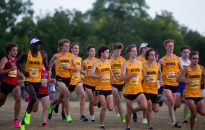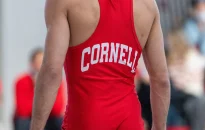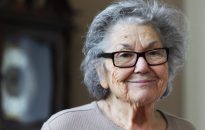To subscribe, click here. Want to purchase today’s print edition? Here’s a map of single-copy locations. Sign up for our daily newsletter here Why he’s Coach of the Year Fisher/Gibson City-Melvin-Sibley’s boys’ soccer team broke through in the sixth year of Robby Dinkins’ coaching tenure with its first Class 1A regional title in 2024. Dinkins […]


Want to purchase today’s print edition? Here’s a map of single-copy locations.
Sign up for our daily newsletter here
Why he’s Coach of the Year
Fisher/Gibson City-Melvin-Sibley’s boys’ soccer team broke through in the sixth year of Robby Dinkins’ coaching tenure with its first Class 1A regional title in 2024. Dinkins guided the Bunnies to 20 wins this fall, giving the program 41 victories since the start of the 2023 season. Staff writer Joey Wright sat down with Dinkins and senior standouts David Hull, Spencer Kleist and Sid Pfoff for the scoop on what’s led the program to its recent heights.
Robby, how would you describe a successful 2024 season?
➜ Dinkins: Coming into the year, we kind of had high expectations. We had a great group coming back and these guys put in a lot of work from the last loss of the season (to Normal U-High) the year before. So they had some high goals, they put in a lot of work and it paid off. We made it as far as we could and still ran into the same giant. But I was pretty proud of the way that the season went and the results that we had.
Where does soccer fit into the landscape of sports at Gibson City-Melvin-Sibley and Fisher?
➜ Dinkins: It starts by giving back because we’ve always had pride in our older players kind of teaching the younger players and getting involved at the youth level. We’ve had a lot of guys in the past come and coach the U14, the U12 and just getting involved with the kids. And just having that impact early, I think that’s really important.
Then just building throughout the summer. We do a lot of team bonding stuff because of the two schools and once we get together, we like to have a lot of fun. It’s not always just about soccer. You just try to build that chemistry and enjoy it. That’s the main thing, is to have fun.
What’s it like combining with teammates from another school and building that bond?
➜ Hull: I feel like growing up, Fisher players kind of know who Gibson City players are (and vice versa), and you kind of build that relationship outside of sports. You start seeing these guys around town, saying, ‘What’s up,’ then eventually you get on travel teams with them and it just kind of clicks from there.
➜ Kleist: Actually, on the way here, Sid said something (about the rivalry). Like, obviously it’s a rivalry between people, between schools, but they’re still normal guys outside of the sport, and we still recognize that we don’t hate them because we play against them. So we can recognize that when it gets to like other people, we can know that they’re not always going to be angry with each other, there’s not always going to be that rivalry there. We can kind of separate the rivalry from the people.
➜ Pfoff: In middle school, we played against each other and the rivalry starts then. And then once you get to high school, everyone just bonds when that first summer hits for freshman year. And the bond just keeps getting bigger and bigger every single year. The chemistry things that we do over the summer definitely help.
Robby, where does your passion for soccer come from?
➜ Dinkins: I actually grew up playing football. Then in high school, my freshman year I knocked myself out of it. Too many concussions. So I ended up switching over to soccer. I learned a lot my first year. I was on a team that, I tell these guys all the time, that did not win a lot of games. We scored one goal all season. But we built that, so by the time I was a senior, we won our first regional game, and that’s at Wilmington High School. You guys probably know them as a powerhouse football team. So, that was a big achievement. Then I ended up playing at Kankakee Community College, and then got back to Gibson City and actually was coaching in multiple sports (including football for coach Mike Allen).
Then I had some guys in my classroom, they were talking to me quite a bit about, ‘Hey, can you come out and help, we know you played.’ So they finally got me out there to help with one of the coaches. Then, by the time I got back out there, I was like, I love this game. They kind of pulled me back into it.
What’s Robby like to play for?
➜ Hull: I didn’t originally grow up in Gibson City. I came in seventh grade to Dinkins’ class and kind of didn’t know what to do. Because I knew Gibson City was a big football school and back in Herscher, we played soccer all the time. So I didn’t really know if Gibson City had a soccer team. … I started playing for him in seventh grade and then got to high school. I’m kind of a hothead, so coach helped me deal with that through freshman year. We kind of built that bond there, and it’s just been amazing ever since.
➜ Kleist: I was a football guy all the way up until high school, but I was not very big my freshman year. So it’s like, all right, I can’t do this anymore, so I went to soccer. I think I surprised coach by showing up to that first meeting. It became the sport that I look forward to the most. It’s very positive the whole time. Even when you’re doing something wrong, he’ll tell you that you’re doing something wrong, but it’s not going to put you down in any way. It’s just the sport I look forward to the most.
➜ Pfoff: I didn’t meet him until that summer going into freshman year. To be honest, I’d never heard of the guy. But after that, the first time I met him, the bond that he had with everybody was (strong). You could just tell he connected with everybody, and that’s one of the biggest reasons we’re so good, is because he can connect with everybody so well.
Robby, how do you manage coaching with other responsibilities outside of sports?
➜ Dinkins: Coaching is my hobby. I love it. I’ve been doing it since I was 17 years old when a basketball coach asked me to come and work at a youth camp.
And I got out there, made connections with the kids, and I was like, ‘This is awesome. I want to do this.’
So then I got into coaching other sports, got into coaching soccer and basketball, then track, and then all the other ones. I don’t like sitting around. It’s all sports, all the time. And then trying to make sure your program is still running throughout the season or in the middle of another season. Kids are talking about doing indoor soccer right now. I’m in the middle of basketball, and they’re doing indoor, so we’ve got to get that going and just trying to help them out. So, it’s not easy to manage, but that’s what I love to do.














